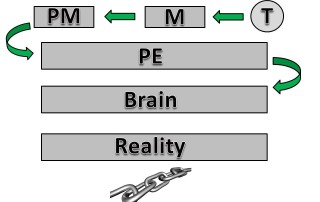Things won’t get better I’ve experienced darkness in my life. Deep darkness. When I was a kid, I was in boy scouts. One time, on a day trip, our scout leaders took us to an abandoned mine shaft. I know, this story has a very promising beginning, just like the last one. Because we didn’t know anything, and apparently neither did our leaders, we wandered into the mine shaft, deeper and deeper into the mountain. Our way was lighted by an actual torch, not a flashlight or lantern. One of our leaders, who just happened to be the one holding the torch and also happened to have the most severe case of ADHD of the bunch of us, thought it would be a funny trick, once we were several hundred feet into the mine shaft, to knock the torch on the ground, extinguishing the flame. The tunnel that we were exploring had curved to the left, meaning that when the torch was gone, the entrance to the shaft was out of sight around a corner, leaving us with absolutely no light. In review, we were 12 year old kids in an abandoned mine shaft and it was so dark, we […]
10 Things Not to Say to Someone Suffering From Depression
Depression is no joke. Which is ironic, given how many people mask it with humor, as the recent case of Robin Williams sadly demonstrates. I find it sadly amusing how many experts there are out there when it comes to dealing with the complex interplay between, society, psychology, and our internal biochemistry. Most of these experts are more than willing to share their homespun advice for the rest of us but the reality is that when it comes to helping someone who suffers from major depressive disorder, it’s rarely that simple. For example, try to avoid these common well-intentioned, yet potentially harmful pieces of wisdom: 1. Cheer up This is not useful advice. It’s like telling a sick person to be healthy. If that were possible, they wouldn’t be sick in the first place. Also, you don’t know the reasons behind the depression. Someone once tried to encourage a client of mine to smile more, seeing only their downcast face and negative body language. What they didn’t realize is that this person’s child had just committed suicide. “Cheer up” is an imperative that no one has the right to issue. 2. You Just Need to Find a Hobby To quote […]
Non-Conformists Unite!!!
Non-linear people in a linear world I used to teach a class called “Understanding Anger and Anxiety”. The class was quite lengthy, taking an entire day. While the class could be summed up in one simple sentence, “Anger is anxiety”, I invested several more hours so that that point would be fully understood and appreciated. I warned the class at the beginning that when I am trying to teach something important, I speak in concentric circles, working my way around the perimeter of the concept, introducing several threads that may at first appear to be unrelated, and then gradually narrowing in on the main point. In this way, they have the proper context for the final, parsimonious concept that I want them to walk away with. Despite this warning, it was obvious to me as the class proceeded that there were people who were having a hard time hanging in there with me as I wandered through philosophy, psychology, sociology, and neurophysiology. As we went around and around in circles talking about so many seemingly unrelated points, their eyes would glaze over. After the class, I sent out e-mails asking for feedback and there were a few people who gave […]












Recent Comments